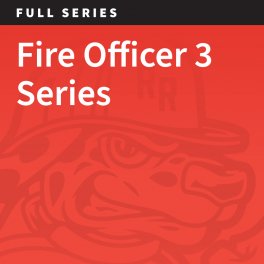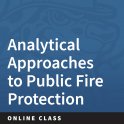Fire Officer 3 Series
Fire Officer 3 Series – Course Description
Ricky Rescue Training Academy’s “Fire Officer 3 Series” is a self‑paced, 153‑hour online fire course with continuous enrollment that provides three required components for the Florida Fire Officer III pre‑certification requirements. This bundle includes Analytical Approaches to Public Fire Protection, Chief Officer, and Ethical and Legal Issues for the Fire Service. It aligns with Florida State Fire College standards and satisfies part of the job performance and educational requirements for Fire Officer III (Administrative Fire Officer).
Detailed Course Content
1. Analytical Approaches to Public Fire Protection (BFST3780)
A 48‑hour online course delivering 48 CEUs designed to teach quantitative reasoning techniques applied to fire protection metrics and planning.
Key learning outcomes:
- Statistical analysis: Interpret fire incident data and apply quantitative methods to assess trends and outcomes.
- Mathematical modeling: Use formulas to compute fire flow, hydraulics, and risk assessments.
- Decision support: Apply numerical reasoning to support fireground and administrative decision-making.
- Critical thinking: Improve problem-solving through structured algorithms and data-driven logic.
- Practical assignments: FFIRS and NFIRS data analysis, probability calculations, cost-benefit modeling, and risk-reduction projects.
- Alignment with NFPA 1021 (Fire Officer III) and NFPA 1037 (Fire Marshal) requirements.
- Grading based on quizzes, assignments, and a final project.
Suggested textbook: Using and Understanding Mathematics: A Quantitative Approach to Reasoning, 5th Ed., W. Bennet & Briggs, ISBN: 9780321652799
2. Chief Officer (BFST9516)
A 60‑hour online course awarding 60 CEUs focused on executive-level leadership and administration in fire service environments.
Key learning outcomes:
- Strategic leadership: Understand organizational planning concepts, budgeting, resource allocation, and mission alignment.
- Human resource management: Learn coaching, evaluation, team-building, and personnel development techniques.
- Incident command integration: Coordinate ICS structures and organizational policy at the chief officer level.
- Policy implementation: Translate vision into departmental procedures, performance metrics, and organizational culture.
- Practical applications: Budget creation, strategic planning, NFIRS data projects, and leadership case studies.
- Coverage of multi-agency service delivery, health and safety program design, and emergency management integration.
- Alignment with NFPA 1021 and NFPA 1037 standards for Fire Officer III and Fire Code Administrator.
Suggested textbook: Chief Officer Principles and Practice, 2nd Ed., Jones & Bartlett, ISBN: 9780763779290
3. Ethical and Legal Issues for the Fire Service (BFST2770)
A 45‑hour online course delivering 45 CEUs, exploring the ethical and legal responsibilities Fire Officer III must manage within modern legal frameworks.
Key learning outcomes:
- Legal standards: Understand regulatory and statutory duties affecting decision-making and authority.
- Ethical leadership: Navigate moral dilemmas using professional codes and ethical theory.
- Liability management: Identify exposure points through documentation, policy application, and critical incident analysis.
- Case law review: Examine precedent-setting incidents relevant to officer-level conduct and agency liability.
- Assignments: Mock trials, case study reviews, and policy development projects.
- Alignment with NFPA 1021 Fire Officer III JPRs for HR management, administration, and government relations.
- Coverage includes Florida Statutes Chapter 633 and FAC 69A as related to fire service administration.
- Practical emphasis on legal compliance, ethical decision-making, and community relations programs.
Suggested textbooks: Legal Considerations for Fire & Emergency Services, J. Curtis Varone, ISBN: 9781401865719; Ethics 101, John C. Maxwell
Course Summary Table
Course | Hours / CEUs | NFPA Alignment | Coverage Highlights |
Analytical Approaches to Public Fire Protection (BFST3780) | 48 h / 48 CEUs | NFPA 1021, NFPA 1037 | Data analysis, modeling, FFIRS/NFIRS, decision support, risk-reduction projects |
Chief Officer (BFST9516) | 60 h / 60 CEUs | NFPA 1021, NFPA 1037 | Leadership, budgeting, HR, ICS, NFIRS projects, emergency management |
Ethical and Legal Issues for the Fire Service (BFST2770) | 45 h / 45 CEUs | NFPA 1021 | Legal compliance, ethical leadership, case law, mock trials, policy development |
- CHAMILO_CODE 2770,9516,9641
Pack content
When completing an online or blended class through Ricky Rescue Training Academy, you will be held completely responsible for your own achievements. You must ensure that you work consistently and diligently to complete the coursework and related requirements in order to move forward. These open enrollment courses allow you to pace yourself, but will require sufficient self-discipline to keep up to date with the workload. Therefore, it is your responsibility to set aside the time required to complete the various units of these courses.






